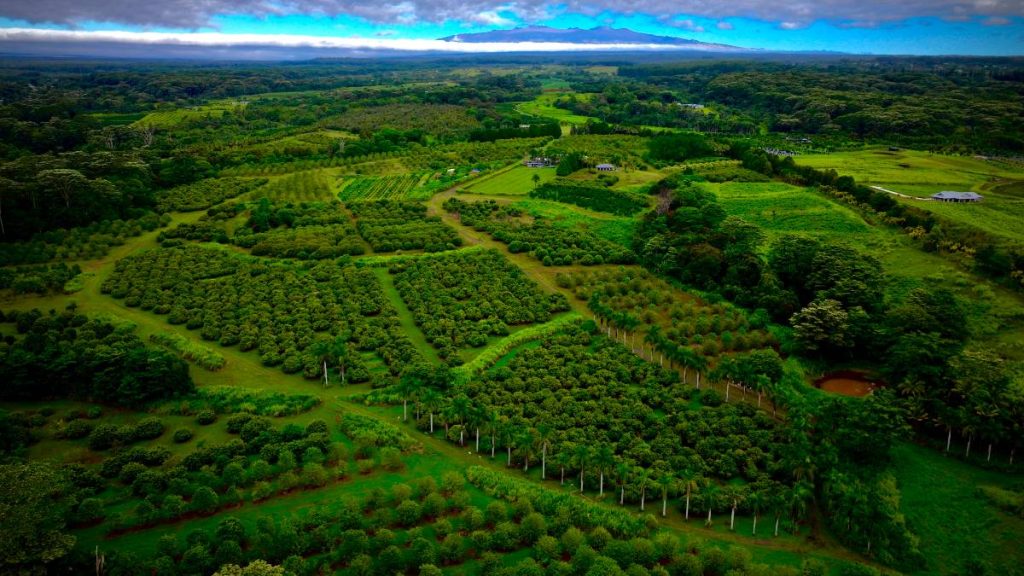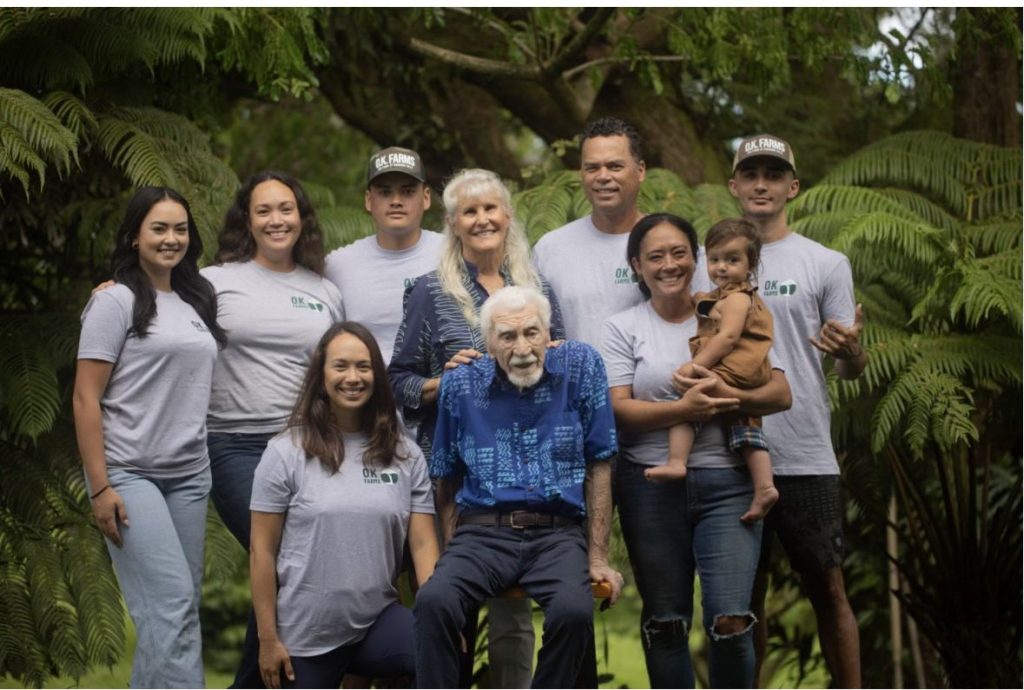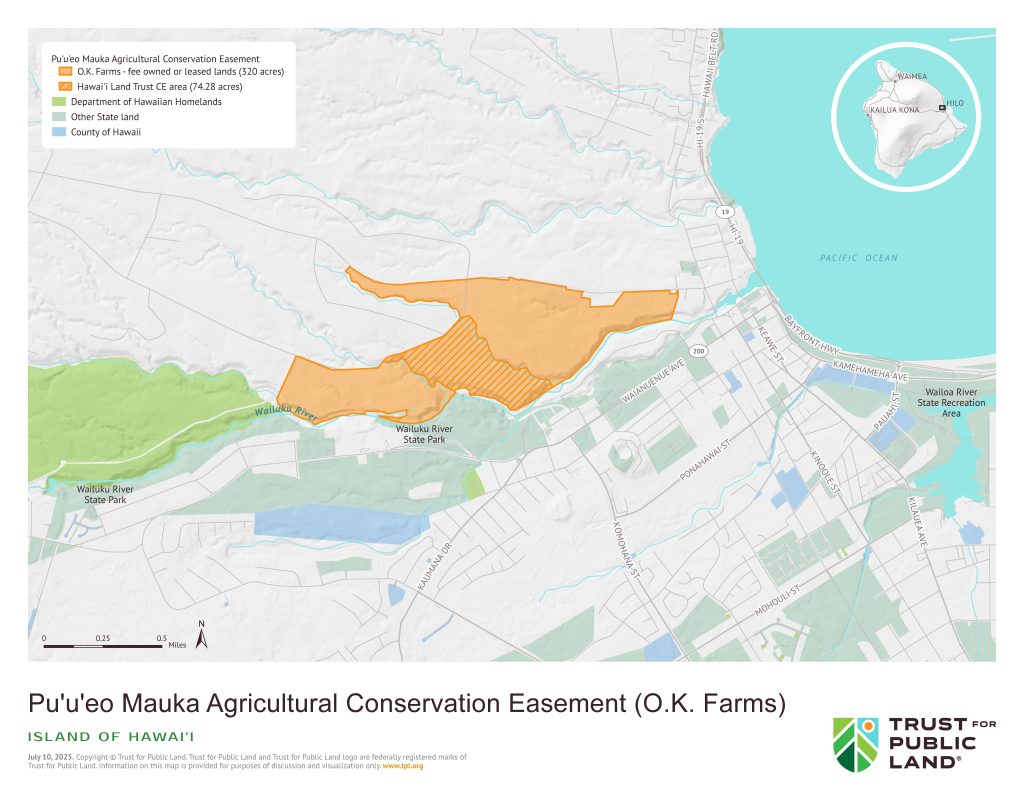 The Pu‘u‘eo Mauka conservation easement protects 74.28 acres of productive agricultural land near Hilo, with more than $1.6 million raised to fund the effort. (Photo courtesy: O.K. Farms)
The Pu‘u‘eo Mauka conservation easement protects 74.28 acres of productive agricultural land near Hilo, with more than $1.6 million raised to fund the effort. (Photo courtesy: O.K. Farms)
O.K. Farms in Hilo, which had been owned by Ed Olson but operated by the Keolanui family, has been growing produce that feeds Hawai‘i Island and beyond for 20 years.
Now, that mission to enhance local food security is assured with the Keolanui family purchasing more than 74 acres of the farm with help from the Hawai‘i Land Trust and Trust for Public Land. The purchase included establishing the Pu‘u‘eo Mauka conservation easement, which mandates the land remain a productive agricultural land in perpetuity.
The land, which already is planted with fruit trees, was appraised at about $2.1 million. After the death of Olson in July 2024, the Edmund C. Olson Trust honored its longstanding relationship with the Keolanui ‘ohana by offering them the first opportunity to acquire the land for about $1.6 million.
Troy Keolanui, co-founder and operations manager of O.K. Farms, said his family never would have been able to secure the land without help from the two nonprofits.
 Keolanui family with the late Ed Olson, who is pictured front and center. (Photo Courtesy: O.K. Farms)
Keolanui family with the late Ed Olson, who is pictured front and center. (Photo Courtesy: O.K. Farms)
“It was going to end up in private hands that may or may not have stayed in agriculture, may or may not have been developed into something other than what it is now in perpetuity,” Keolanui said.
ARTICLE CONTINUES BELOW ADARTICLE CONTINUES BELOW AD
The Keolanui family and Olson joined forces in 2002 to start O.K. Farms, located along the Wailuku River and Rainbow Falls, with a plan to perpetuate sustainable agriculture in Hawai‘i.
“Our mission here at O.K. Farms is to get people reconnected to the ‘āina and to what’s growing here in Hawai‘i,” Keolanui said. “We can be an example of what sustainability really can look like.”
OK Farms is 320 acres. Outside of the recently secured 74-acre easement, Keolanui said the rest of the farmland is owned by himself and members of his family.
O.K. Farms cultivates a variety of tropical fruits, including lychee, longan, rambutan and citrus, as well as spices such as cinnamon, allspice, cloves and nutmeg. The farm is one of the largest producers of tropical fruit in the United States. It also grows hearts of palm and its own brand of Rainbow Falls Hilo Coffee.
The farm enhances local food security through farm boxes and community-supported agriculture programs. The family also puts local produce in homes across the state and in all the grocery stores through their partnership with Cisco Foods.
ARTICLE CONTINUES BELOW AD
Overall, in fruit, Keolanui estimates the farm annually produces 400,000 pounds of fruit. Lychee is typically the farm’s most productive crop, producing about 75,000 pounds a year.
O.K. Farms is also associated with the Hawaiʻi Good Food Alliance and a member of the Hawai‘i Food Hub Hui, which are organizations committed to sharing the production and aggregation of locally grown foods and distributing them directly from farms to consumers.
“It’s a really great way to get the food directly from the farms right to the people who are going to eat that food,” Keolanui said. “Eliminate some of the middle work and the food is fresher, and gets to the people quicker.”
Part of the farm’s efforts to connect the community to the land started three years ago, when they developed an agroforestry field with help from Hawai‘i ‘Ulu Cooperative, an organization owned by more than 150 local farmers with breadfruit crops.
Starting with a five-acre block, Keolanui said the farm opened it up to monthly community work days where keiki to kūpuna can come and connect with the land.
ARTICLE CONTINUES BELOW AD
Keolanui said securing the easement hits every part of the mission statement by the Olson Trust.
“It’s all about supporting sustainable agriculture, protecting the natural resources and investing in Hawai’i’s people,” he said. “And this one hits all three right on the head.”
Olu Campbell, president and CEO of Hawai‘i Land Trust, said the organization’s goal is closely aligned with Keolanui in terms of connecting people with the ‘āina and the value that doing that creates both for the health of Hawai‘i Island and the community.
“We wanted to see that same vision come to fruition and to the extent that we could be helpful in bringing that to life, by playing a small part in helping to get this conservation easement closed,” Campbell said.
 Pu‘ueo Mauka easement secured within O.K. Farms in Hilo. (Photo courtesy: Trust for Public Land)
Pu‘ueo Mauka easement secured within O.K. Farms in Hilo. (Photo courtesy: Trust for Public Land)
Lea Hong, associate vice president and Hawai‘i state director for Trust for Public Land, said the Pu‘u‘eo Mauka represents a model for community-driven conservation.
“This collaboration keeps Hawai‘i’s agricultural lands working, supports local farmers, and safeguards our island’s cultural and natural heritage for generations to come,” Hong said, expressing her gratitude to the Edmund C. Olson Trust for working with the trusts to ensure these lands remain in agriculture forever.
Campbell said the trust has helped secure or purchased outright more than 10 agricultural, natural or cultural resources easements.
“We also have sites on Hawai‘i Island that we own ourselves and self-steward; one in Mahukuana and then another right above Hilo, we call her Kukuau Forest Reserve.”